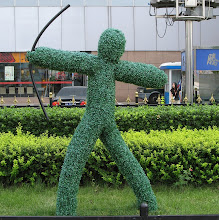Oracle: I told you before. No one can see beyond a choice they don't understand, and I mean no one.
--Matrix, Revolution
Though the choice seems obvious for me, I experienced a certain extent of confusion when facing big decision in life: to work or to pursue a higher degree. The underlying question of this choice seems to be what I am going to do in the future, what my life goal is, because this decision will undoubtedly affect my life in future. However, I found that my decision is based mostly, not on the vision of the future, which is inherently vague and indefinite for me, but on what I have done in the past. Since every graduate or professional program asks the candidates what preparation of knowledge and skill they have in that specific area, it also seems to be practical and reasonable to do things as if we are laying the bricks, one based another, never awry. But isn't it a bit monotonous?
Where is the change? Where is the turn? Where is the jump? But before answering those questions, answer these questions first: what to change? Where to turn? Where to jump? Ironically, I am back on the original point of the old-friend-like question, which is asked again and again since primary school: what do I want to do? What I have done and what I will do seem to like the questions of which is the first: egg or chicken? The truth, I think, may be that one will never make a decision with absolutely full confidence of its consequences.
Everyone travels with a certain degree of confusion of the destiny. And so do I.
